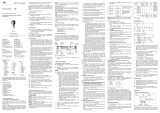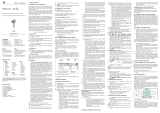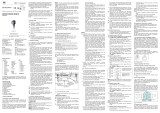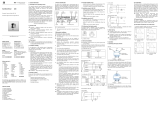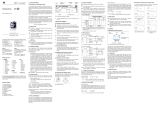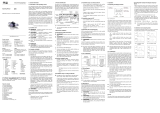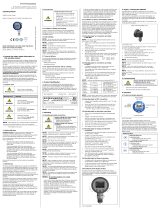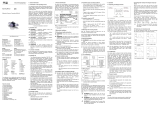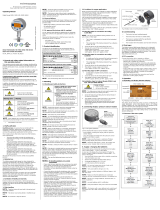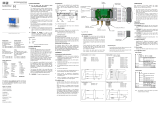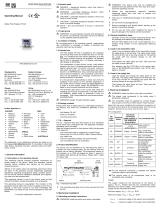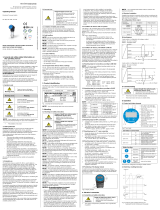Page is loading ...

Operating Manual
Digital pressure gauge BAROLI 02, 05, 02 P, 05 P
Headquarters
BD SENSORS GmbH
BD-Sensors-Str. 1
D - 95199 Thierstein
Germany
Tel.: +49 (0) 9235-9811-0
Fax: +49 (0) 9235-9811-11
Eastern Europe
BD SENSORS s.r.o.
Hradištská 817
CZ - 687 08 Buchlovice
Czech Republic
Tel.: +42 (0) 572-4110 11
Fax: +42 (0) 572-4114 97
Russia
BD SENSORS RUS
39a, Varshavskoe shosse
RU - Moscow 117105
Russia
Tel.: +7 (0) 95-380 1683
Fax: +7 (0) 95-380 1681
China
BD SENSORS China Co, Ltd.
Room B, 2nd Floor, Building 10,
No. 1188 Lianhang Rd.
201112 Shanghai,
China
Tel.: +86 (0) 21-51600 190
Fax: +86 (0) 21-33600 613
further agencies in:
EUROPE
• Belgium
• Denmark
• Finland
• France
• Great Britain
• Greece
• Italy
• Lithuania
• Luxemburg
• Netherlands
• Norway
• Poland
• Portugal
• Romania
• Sweden
• Switzerland
• Slovakia
• Spain
• Turkey
• UK
• Ukraine
AFRICA
• Egypt
• South Africa
ASIA
• India
• Iran
• Israel
• Japan
• Kazakhstan
• Malaysia
• Singapore
• Taiwan
• Thailand
• Vietnam
AUSTRALIA
The addresses of our distribution partners are listed on our
homepage www.bdsensors.com. It is possible to download
data sheets, operating manuals, ordering codes and certifi-
cates, as well.
1. General information
1.1 Information on the operating manual
This operating manual contains important information on
proper usage of the device. Read this operating manual
carefully before installing and starting up the pressure
measuring device.
Adhere to the safety notes and operating instructions which
are given in the operating manual. Additionally applicable
regulations regarding occupational safety, accident
prevention as well as national installation standards and
engineering rules must be complied with!
This operating manual is part of the device and must be
kept at a, for the personnel always accessible location,
close to the installation position of the device.
This operating manual is copyrighted. The contents of this
operating manual reflect the version available at the time of
printing. It has been issued to our best knowledge and
belief. However, errors may have occurred. For incorrect
statements and their consequences, liability cannot be
assumed by BD SENSORS.
– Technical modifications reserved –
1.2 Symbols used
DANGER! – Dangerous situation, which may result in
serious or fatal injuries
WARNING! – Potentially dangerous situation, which
may result in fatal or serious injuries
CAUTION! – Potentially dangerous situation, which
may result in minor injuries
! CAUTION! – Potentially dangerous situation, which
may result in damage of objects
NOTE – Tips and information for the user to ensure
good conditions for the operation.
1.3 Target group
WARNING! To avoid hazards for the operator and
damages of the device, following described instructions
have to be worked out by qualified technical personnel.
1.4 Limitation of liability
No liability is assumed and warranty claims are excluded in
case of non-observance of the operating manual, improper
application, modification of or damage to the device.
1.5 Intended use
- The battery powered digital pressure gauge BAROLI has
been exclusively designed for applications in hydraulics
and pneumatics as well as for mechanical engineering.
It can be easily and quickly installed in situ.
- It is in the responsibility of the user to verify whether the
chosen device is suitable for the intended application.
In case of any doubts, contact our sales department to
eliminate any indistinctness. BD SENSORS does not
assume any liability for an incorrect selection and its
consequences!
- Permissible media are gases or liquids, which are
compatible with the media wetted parts described in
the data sheet. In addition it has to be ensured, that
this medium is compatible with the media wetted parts.
- The technical data listed in the current data sheet are
engaging. If the data sheet is not available, please or-
der or download it from our homepage.
(http://www.bdsensors.com)
WARNING! – Danger through improper usage!
1.6 Package contents
Please verify that all listed parts are undamaged included in
the delivery and check for consistency specified in your
order:
- digital pressure gauge BAROLI
- mounting instructions
2. Product identification
The device can be identified by its manufacturing label. It
provides the most important data. By the ordering code, the
product can be clearly identified. For identification of the
firmware the program version will appear for about 1 second
in the display after starting up the device. Please hold it
ready for inquiry calls.
Fig. 1 manufacturing label
! The manufacturing label must not be removed from the
device!
3. Mechanical installation
3.1 Mounting and safety instructions
WARNING! Install the device only when depressurized
and currentless!
WARNING! This device may only be installed by
qualified technical personnel who has read and
understood the operating manual!
! Handle this electronic precision measuring device
carefully in packed as well as in unpacked condition!
! The device must not be subject to any changes or
modifications.
! The device may not be thrown!
! To avoid damaging the diaphragm, remove packaging
and protective cap only directly before starting up the
device. A delivered protective cap must be stored!
! Place the protective cap on the pressure port again
immediately after disassembling.
! Handle the unprotected diaphragm very carefully - it is
very sensitive and may be easily damaged.
! Do not use any force when installing the device to
prevent damage of the device and the plant!
! The display and the plastic housing are equipped with
rotational limiters. Please do only rotate the display or
the housing within the limit.
Take note that no inadmissibly high mechanical
stresses occur at the pressure port as a result of the
installation, since this may cause a shifting of the
characteristic curve or the demage.
In hydraulic systems, position the device in such a way
that the pressure port points upward (venting).
Provide a cooling line when using the device in steam
lines.
3.2 General installation steps
- Carefully remove the pressure measuring device from
the package and dispose of the package properly.
- Then go ahead as detailed in the specific instructions
below.
3.3 Installation steps for DIN 3852
DO NOT USE ANY ADDITIONAL SEALING MATERI-
ALS, LIKE YARN, HEMP OR TEFLON TAPE!
- Check to ensure the proper groove fitting of the o-ring
and additionally to ensure no damage to the o-ring.
- Ensure that the sealing surface of the taking part is
perfectly smooth and clean. (RZ 3.2)
- Screw the device into the corresponding thread by
hand.
- If you have a device with a knurled ring, the transmitter
has to be screwed in by hand only.
- Devices with a spanner flat have to be fully tightened
with an open-end Devices with a spanner flat have to
be tightened with an open-end wrench (G1/4": approx.
5 Nm; G1/2": approx. 10 Nm; G3/4": approx. 15 Nm;
G1": approx. 20 Nm; G1 1/2": approx. 25 Nm).
- The indicated tightening torques must not be ex-
ceeded!
3.4 Installation steps for EN 837
- Use a suitable seal, corresponding to the medium and
the pressure input (e. g. a cooper gasket).
- Ensure that the sealing surface of the taking part is
perfectly smooth and clean. (RZ 6.3)
- Screw the device into the corresponding thread by
hand.
- Tighten it with a wrench (for G1/4": approx. 20 Nm; for
G1/2": approx. 50 Nm).
- The indicated tightening torques must not be ex-
ceeded!
3.5 Installation steps for NPT
- Use a suitable seal (e. g. a PTFE-strip).
- Screw the device into the corresponding thread by
hand.
- Tighten it with a wrench (for 1/4" NPT: approx. 30 Nm;
for 1/2" NPT: approx. 70 Nm).
- The indicated tightening torques must not be ex-
ceeded!
3.6 Installation steps for dairy pipe
- Check to ensure that the O-ring fits properly into the
intended groove in the mounting part.
- Center the dairy pipe connection in the counterpart.
- Screw the cup nut onto the mounting part.
- Then tighten it with a hook wrench.
3.7 Installation steps for Clamp and Varivent
- Use a suitable seal corresponding to the medium and
the pressure input.
- Put the seal onto the corresponding mounting part.
- Center the Clamp or Varivent connection on the fitting
counterpart with seal.
- Then fit the device with a suitable fastening element (e.
g. semi-ring or retractable ring clamp) according to the
supplier’s instructions.
3.8 Installation steps for connecting flanges
- Use a suitable seal corresponding to the medium and
pressure input. (e. g. a fiber gasket).
- Put the seal between connecting flange and counter
flange.
- Install the device with 4 resp. 8 screws (depending on
flange version) on the counter flange.
3.9 Positioning of the display module
The display module of the pressure gauge is rotatable so
that clear readability is guaranteed even on unusual
installation positions.
4. Supply / changing the batteries
The digital pressure gauge is supplied by two 3.6 V-lithium-
batteries (Type 1/2 AA). Stored values/parameters are also
kept after changing the batteries.
If the symbol for low batteries is indicated in the display, it is
necessary to replace them as soon as possible with two
new ones of the same type in order to ensure a good
readability of the values. This has only to be done in
switched-off condition.
The battery case is located under the black, circular plastic
cap on the top of the housing. To change the batteries go
ahead as follows:
Ordering code
Type designation
Input
Serial
number
www.bdsensors.com
EN

BAROLI_E_011013
- turn the plastic cap 45° anti
clockwise by a coin (e.g. 2 €
coin) as far as possible
- hold the count tight and lever
the plastic cap out of the
housing with help of the
count
- take the cap off and change
the batteries
- lock the device after that
properly
! An incorrect usage may cause a leak out of batteries
and so a damage the device!
! Never combine batteries of different types or old with
new ones.
! Make sure that the batteries are connected correctly
with the corresponding contacts in the battery tray.
! Never try to charge batteries, demount them, or short-
circuit them.
! Keep the batteries away from heat and unshielded
flame.
5. Initial start-up
WARNING! Before start-up, the user has to check for
proper installation and for any visible defects.
WARNING! The device can be started and operated by
authorized personnel only, who have read and under-
stood the operating manual!
WARNING! The device has to be used within the
technical specifications, only (compare the data in the
data sheet)!
6. Placing out of service
WARNING! When dismantling the device, it must
always be done in the depressurized and currentless
condition! Check also if the medium has to be drained
off before dismantling!
WARNING! Depending on the medium, it may cause
danger for the user. Comply therefore with adequate
precautions for purification.
7. Operation
7.1 Operating and display elements
Fig. 3 LC-display
The indication of the measured value as well as the
configuration of the individual parameters occurs menu-
driven via the LC display. The individual functions can be
set with the help of three miniature push buttons located in
the front.
The menu system is a closed system allowing you to scroll
both forward and backward through the individual set-up
menus to navigate to the desired setting item. All settings
are permanently stored in an EEPROM and therefore
available again even after a battery change.
7.2 Structure of the menu system
7.3 Menu list
8. Maintenance
In principle, this device is maintenance-free. If desired, the
housing of the device can be cleaned when switched of
using a damp cloth and non-aggressive cleaning solutions.
With certain media, however, the diaphragm may be pol-
luted or coated with deposit. It is recommended to define
corresponding service intervals for control.. After placing the
device out of service correctly, the diaphragm can usually
be cleaned carefully with a non-aggressive cleaning solution
and a soft brush or sponge. If the diaphragm is calcified, it is
recommended to send the device to BD SENSORS for
decalcification. Please read therefore the chapter “Repair”
below.
! A false cleaning of the device can cause an irreparable
damage on the diaphragm. Therefore never use
pointed objects or pressured air for cleaning the dia-
phragm.
9. Return
Before every return of your device, whether for recalibration,
decalcification, modifications or repair, it has to be cleaned
carefully and packed shatter-proofed. You have to enclose a
notice of return with detailed defect description when
sending the device. If your device came in contact with
harmful substances, a declaration of decontamination is
additionally required. Appropriate forms can be downloaded
from our homepage www.bdsensors.com. Should you
dispatch a device without a declaration of decontamination
and if there are any doubts in our service department
regarding the used medium, repair will not be started until
an acceptable declaration is sent.
If the device came in contact with hazardous
substances, certain precautions have to be
complied with for purification!
10. Disposal
The device must be disposed according to the
European Directives 2002/96/EG and
2003/108/EG (on waste electrical and electronic
equipment) Waste of electrical and electronic
equipment may not be disposed by domestic
refuse!
WARNING! Depending on the measuring medium,
deposit on the device may cause danger for the user
and the environment. Comply with adequate
precautions for purification and dispose of it properly.
11. Warranty conditions
The warranty conditions are subject to the legal warranty
period of 24 months from the date of delivery. In case of
improper use, modifications of or damages to the device, we
do not accept warranty claims. Damaged diaphragms will
also not be accepted. Furthermore, defects due to normal
wear are not subject to warranty services.
12. Declaration of conformity / CE
The delivered device fulfils all legal requirements. The
applied directives, harmonised standards and documents
are listed in the EC declaration of conformity, which is
available online at: http://www.bdsensors.com.
Additionally, the operational safety is confirmed by the CE
sign on the manufacturing label.
limit exceeding
neg. / pos.
symbol for
indicate
low
batteries
unit
measured value
plastic cap above
battery case
Fig. 2 battery case
1 P MIN
Minimum pressure display
▼–button: puts the current pressure as minimum value
▲–button: puts the value on zero
2 P MAX
Maximum pressure display
▼–button: puts the current pressure as maximum value
▲–button: puts the value on zero
3 LOWER
Displaying of the lower range
This value was determined on the order and cannot be changed.
4 UPPER
Displaying of the upper range
This value was determined on the order and cannot be changed.
5 DECIMA
Setting of the decimal point position
Depending on the nominal pressure range and on the set unit, only a limited number of positions after
the decimal point can be displayed.
6 UNIT
Setting of the pressure unit
Permissible units: bar, mbar, PSI, InHg, cmHg, mmHg, hPa, kPa, Mpa, mH2O, InH2O.
Along with the unit, the decimal point position has probably to be changed in order to get a correct
indication of the measured value. Besides, depending on the nominal pressure range, perhaps not all
available units can be used.
7 SW OFF
Configuration of the switch-off automatic
Meaning of the permissible number:
"0": switch-off automatic is turned off
"1" – "5": automatic switch-off in 1 to 5 minutes
8 CAL ZP
Calibration of initial point
If you detect a shifting of the measured value deviating from the offset, the display can be re-calibrated. For
this, a pressure reference is necessary if the offset differs from the ambient pressure. The used pressure
must be identical to the starting point of the pressure measuring range. For reading the new pressure into
the device, push the ▲ button.
Please note the following diviation:
-1 … x bar: the offset is calibrated at -0.9 bar; during calibration we check whether the device will be within
tolerance at -1 bar (in theory); for re-calibration a pressure reference of -0.9 bar is necessary
0 … x bar abs.: the offset is calibrated at 0.1 bar abs.; during calibration we check whether the device will
be within tolerance at 0 bar abs.; for re-calibration a pressure reference of 0.1 bar is necessary
If the re-calibration leads to a worsening of the original calibration, e. g. as a result of a defect pressure
reference, the defaults can be re-set by the menu item "LD FAC" according to your order
9 CAL EP
Calibration of end point
If you detect a shifting of the measured value deviating from the end point, the display can be re-calibrated.
For this, a pressure reference is necessary if the offset differs from the ambient pressure. The used pres-
sure must be identical to the end point of the pressure measuring range. For reading the new pressure into
the device, push the ▲ button.
If the re-calibration leads to a worsening of the original calibration, e. g. as a result of a defect pressure
reference, the defaults can be re-set by the menu item "LD FAC" according to your order.
10 LD FAC
Load defaults
To load the defaults you have to push the ▲–button. After the action "LOADED" and "OK" appers in the
display for a short time. The configuration mode will be left automatically.
- ▲ / on button: with this button you turn the device on; in the operating mode you move forward in the menu system or
increase the displayed value
- ▼ / off button: with this button you turn the device off; in the operating mode you move backwards in the menu system or
decrease the displayed value
- OK-button: with this button you enter the operating mode; besides, it is used to activate the different menu items and
to confirm the set values
To configure the different menu items, set the desired values by pushing the "▼" or "▲" buttons. Confirm the setting with the
„OK“ button and the menu item will start blinking to indicate that you can start the configuration.
To save the configured values or to leave a menu item, you also have to push the “OK” button.
Changes of the adjustable parameters become only effective after pushing the OK button and leaving the menu item. After
leaving the menu system, all parameters will be checked against each other and in reference to the characteristics of the
device. If the message "OK" appears in the display for some seconds, the configuration was successfully. If the message
"ERROR" appears, at least one of the set values is out of the permissible range. For example, an error will occur if a device
with a nominal pressure range of 400 bar should be set on 4 positions after the decimal point. If an error has been de-
tected, the lastly runnable parameters will be set again.
After configuring the unit, the conversion of the pressure range (in menus UPPER and LOWER) into the new unit will only
occur after leaving the complete menu system. Besides, depending on the number of displayed figures of the respective
nominal pressure range, probably not all available units (in menu UNIT) can be used.
/
